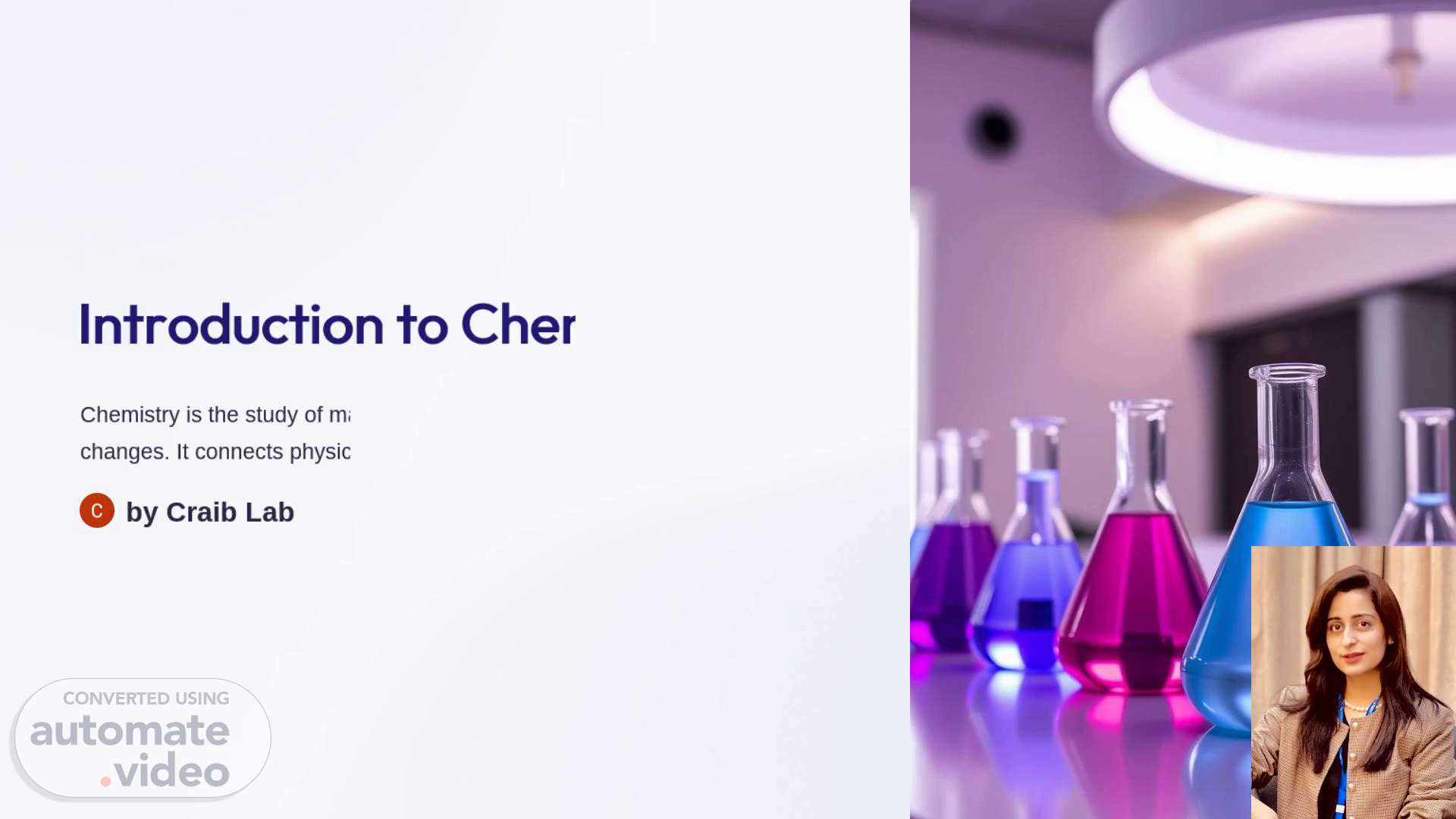Scene 1 (0s)
Introduction to Chemistry. Chemistry is the study of matter's composition, structure, properties, and changes. It connects physical sciences with life and applied sciences..
Scene 2 (16s)
[Audio] Chemistry is the study of how atoms and molecules come together to form substances, and how these substances behave and react with each other. This involves understanding their composition, structure, and properties, as well as the changes they undergo when reacting with other substances..
Scene 3 (34s)
[Audio] Chemistry can be divided into several major branches, each focusing on specific aspects of the subject. Organic chemistry studies the properties and reactions of carbon-based compounds, which are found in all living things and are essential for life. Inorganic chemistry, on the other hand, focuses on non-carbon compounds such as metals and minerals. Physical chemistry explores the physical principles underlying chemical systems, while analytical chemistry involves techniques for identifying and quantifying substances. Lastly, biochemistry examines the complex interactions between biomolecules and their roles in biological processes, studying the chemistry of living organisms..
Scene 4 (1m 15s)
[Audio] Chemistry plays a crucial role in our daily lives, from the food we eat to the medicines we take. In cooking, chemical changes occur when ingredients react with each other, resulting in new flavors and textures. This process is essential for creating delicious meals. Similarly, in healthcare, medications are designed using chemistry to target specific diseases and improve patient outcomes. These examples illustrate how chemistry is an integral part of our daily experiences, shaping the world around us..
Scene 5 (1m 45s)
[Audio] Iron reacts with oxygen in a process called rusting, which results in the formation of iron oxide. When moisture is present, this reaction is accelerated, demonstrating the importance of water as a catalyst. As a result, a reddish layer of rust appears on the surface of the metal. This example illustrates the significant role that chemical reactions play in shaping our world..
Scene 6 (2m 9s)
[Audio] Chemistry plays a crucial role in the formation of water, as it involves the combination of hydrogen atoms to form a single molecule, followed by the bonding of oxygen with these hydrogen molecules. This process demonstrates the fundamental principles of chemistry, where atoms unite to create new substances. Ultimately, the resulting compound, H₂O, is vital for sustaining life, underscoring the importance of chemistry in comprehending our surroundings..
Scene 7 (2m 39s)
[Audio] Enzymes play a crucial role in breaking down food into nutrients by facilitating chemical reactions that convert complex molecules into simpler ones, making them more easily absorbed by the body. Stomach acid also breaks down proteins, and as the nutrients are released, they can be absorbed through the intestinal walls, providing the body with the necessary sustenance. This process demonstrates the importance of chemistry in our daily lives, showing how it enables us to extract valuable resources from the food we eat..
Scene 8 (3m 11s)
[Audio] Chemistry is the study of matter's composition, structure, properties, and changes. We have examined the various branches of chemistry, including Organic and Inorganic, Physical, Analytical, and Biochemistry. Additionally, we have seen how chemistry influences our daily lives, such as in cooking, cleaning, and understanding our bodies through digestion. To move forward, it is essential to grasp the fundamentals of chemistry, encompassing matter, atoms, and molecules. Explore the diverse branches of chemistry and pinpoint areas that captivate your attention. Moreover, recognize the chemical reactions occurring around us daily and relate these concepts to practical examples. This will provide a sturdy basis for further exploration in your academic pursuits..
